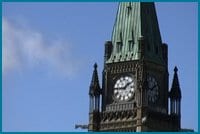The Tory government’s Age Of Consent bill has died, following Prime Minister Stephen Harper’s decision Sep 4 to end the current session of Parliament.
The current session was set to resume Sep 17, but Harper announced that he will prorogue Parliament and open with a new session on Oct 16.
In Canada’s political system, bills expire if they are not passed by the time a session ends. However, the government still has the ability to reintroduce expired bills in future sessions.
Among the bills that have died is C-22, an act to raise the age of sexual consent from 14 to 16.
Andrew Brett, a member of the youth-led Age Of Consent Committee, opposed C-22 before the parliamentary justice committee in March. He says he is in disbelief over the unexpected ‘good’ news.
“It seems like it would be a really difficult thing to do all over again. We’ve seen how long it took to get to this point, and it’s still only in the Senate,” he says.
Bill C-22 passed third reading in the House Of Commons in May. A few individual Bloc, Liberal and NDP MPs spoke against the bill, but no party officially opposed the bill.
Queer activists say the bill was an unfair attack on youth rights and sexual freedom. As well, C-22 did not remove the age of consent for anal sex, which is now set at 18 under Canada’s Criminal Code.
Studies show that youth are less likely to seek sexual health information or advice if they fall below the age of consent.
Harper’s decision also affects other bills of queer interest:
- Immigration Minister Diane Finley’s Bill C-57 proposed to give the minister power to direct immigration officials to reject refugee and immigrant applicants on the basis of social policy considerations. Finley said she would ban work permits for immigrant strippers. That bill is dead after its second reading in the House.
- Bill C-44, which would have enforced the Canada Human Rights Act (CHRA) on First Nations reserves thus giving queers the benefits of that protection there, was controversial among parliamentarians who hesitate to impose Canadian law on First Nations peoples. That bill dies after its second House reading.
- NDP MP Bill Siksay’s private member’s Bill C-236 would add “gender identity” to the list of prohibited grounds for discrimination under the CHRA. NDP MP Joe Comartin’s private member’s Bill C-438 would equalize the age of consent for anal intercourse with other sex acts. Presently the age of consent for anal sex is 18. Both of those bills are awaiting second reading in the House but as private member’s bills will continue in new positions on the order paper after Parliament resumes.
- Liberal MP Boris Wrzesnewskyj’s Bill C-254 proposed to add any group “distinguished by its sex” to the list of those groups protected against hate propaganda. The bill did not explicitly protect trans people but “sex” has been interpreted in the jurisprudence to include them. That bill will also continue after Parliament resumes with a new position on the order paper.
- Other private member’s bills include several that deal with child pornography from both opposition and government MPs.
- Several government initiatives, including the Clean Air and Climate Change Act and several bills relating to the Tories’ law-and-order agenda, have expired.
Any of the dead legislation may be reintroduced after Parliament resumes but an individual government bill can only return to its last stage in the legislative process with the consent of the opposition parties. Without opposition support it’s back to square one for each government bill.
According to parliamentary process the new session means Harper’s Conservatives will need to deliver a speech from the throne in which they outline their legislative priorities and plans for the next session. The House of Commons will then vote to either accept or reject the government’s plan.
The Tories control only 125 of the 307 seats in the House of Commons. There are seven vacant seats, three of which will be filled in by-elections on Mon, Sep 17. Toronto Centre is among the ridings facing a by-election but no date has been set for that competition.
If all of the opposition parties vote to reject Harper’s throne speech, the likely result will be a general election this fall, which would kill all private member’s bills. It would also give Harper the opportunity to win a majority government. If the Conservatives do win a majority of seats in the House Harper will be in a stronger position to implement his law-and-order, family values and national security agendas.


 Why you can trust Xtra
Why you can trust Xtra


